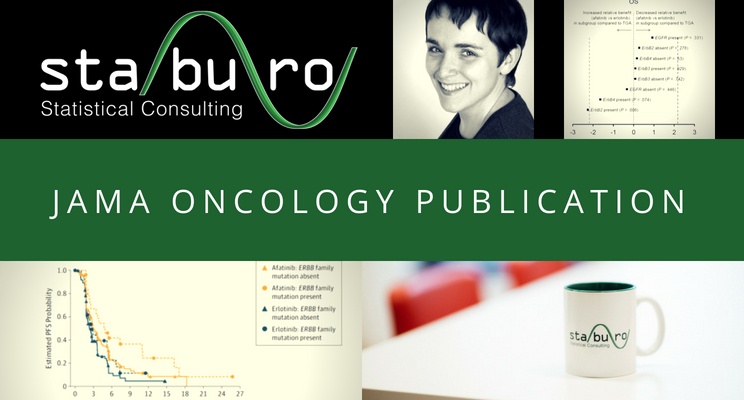
Biomarker analyses published in JAMA Oncology
Staburo supported biomarker analyses for a phase III lung-cancer trial. The paper, which was recently published in JAMA Oncology, is a retrospective analysis to assess the association of ErbB mutations with clinical efficacy. Statistical analyses include the identification of predictive and prognostic biomarkers, and the evaluation of their impact using standardized effect plots.
Highlights of the study:
DESIGN, SETTING, AND PARTICIPANTS:
Ad hoc secondary analysis of the LUX-Lung 8 trial, conducted at 183 centers in 23 countries from March 30, 2012, to January 30, 2014. Eligible patients had stage IIIB or IV lung squamous cell carcinoma, with progressive disease after 4 or more cycles of platinum-based chemotherapy.
MAIN OUTCOMES AND MEASURES:
Overall survival, PFS, pooled and individual ERBB gene mutations, ERBB copy number alterations, and EGFR expression.
RESULTS:
Tumor specimens from 245 patients were eligible for next-generation sequencing (TGA subset: 132 patients treated with afatinib; 113 patients treated with erlotinib). In this population, outcomes were improved with afatinib vs erlotinib treatment (PFS: median, 3.5 vs 2.5 months; hazard ratio [HR], 0.69; 95% CI, 0.51-0.92; P = .01; OS: median, 8.4 vs 6.6 months; HR, 0.81; 95% CI, 0.62-1.05; P = .12). Of 245 patients in the TGA subset, 53 (21.6%) had tumors with 1 or more ERBB mutations. Among afatinib-treated patients, PFS (median, 4.9 vs 3.0 months; HR, 0.62; 95% CI, 0.37-1.02; P = .06) and OS (median, 10.6 vs 8.1 months; HR, 0.75; 95% CI, 0.47-1.17; P = .21) were longer among those with ERBB mutation–positive disease than among those without. The presence of HER2 mutations was associated with favorable PFS and OS following afatinib vs erlotinib treatment. There was no apparent association between copy number alteration or EGFR expression level and outcome.
CONCLUSIONS AND RELEVANCE:
Next-generation sequencing may help identify patients with lung squamous cell carcinoma who would derive additional benefit from treatment with afatinib. The role of ERBB mutations, particularly HER2 mutations, as predictive biomarkers for afatinib treatment in this setting warrants further evaluation.
You can find the full publication here:
Goss, Glenwood D., et al. “Association of ERBB mutations with clinical outcomes of afatinib-or erlotinib-treated patients with lung squamous cell carcinoma: secondary analysis of the LUX-Lung 8 randomized clinical trial.” JAMA oncology (2018).
https://jamanetwork.com/journals/jamaoncology/fullarticle/2684635

Recent Comments